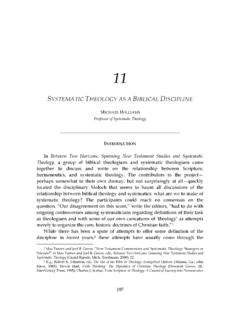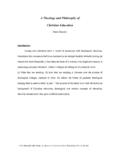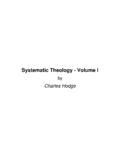Transcription of Introduction to a Christian worldview
1 I Introduction to a Christian worldview A course in thinking Christianly about the whole of life Chris Gousmett (c) Chris Gousmett, 1996 This edition is produced solely for use as a course manual and is not to be sold, copied or otherwise reproduced in any form. ii Contents Introduction 1. The nature and function of worldviews .. 1 2. Religion true and false .. 16 3. The problem of dualism and synthesis in Christianity .. 30 4. Major themes in a worldview : Human nature, truth, meaning, purpose . 46 5. Scripture as the source of a Christian worldview .
2 59 6. The contours of a Biblical worldview .. 70 7 Structure and direction. Sin and evil. Common grace .. 87 8. The task and calling of humankind: to care for the creation .. 104 9. The nature of Christian community. A Christian view of society.. 119 10. The Kingdom of God: God's righteous rule over the whole creation . 136 Bibliography .. 157 iii Introduction The creation of the Father, fallen in sin, is redeemed by the death of the Son of God and is being transformed by the Holy Spirit into the kingdom of God. Herman Bavinck This series of studies is designed to provide a basic Introduction to a distinctively Christian worldview that seeks to see the whole gospel applied to the whole of life.
3 This Christian worldview makes a difference, because it is significant for our life in the world. It shapes and directs our lives in important ways, because it is the framework of our most basic beliefs about everything. These studies provide an initial Introduction to the idea that Christianity provides a coherent, robust and significant basis for life that is a distinctive and genuine alternative to the prevailing worldviews which currently shape our society. No doubt there will be many questions arising out of these studies that cannot be dealt with adequately in a course such as this.
4 Such questions can be followed up in some of the material mentioned in the reading lists. 1 1 The nature and function of worldviews 1. The nature and function of worldviews _____ 2 What is a worldview ? What is a worldview and why is it important? In order to get us started thinking, we can for the moment define a worldview as "the comprehensive framework of one's basic beliefs about things and their relationships." These "things" are anything about which it is possible to have a belief, for instance: God human life the meaning of suffering family relationships morality the significance of rainbows So a worldview is the basic perspective we use to understand the world around us and our experience of it.
5 This is not the same as saying that "everyone has a philosophy." Nor is a Christian worldview the same as "theology." It is commonly held that "theology" appeals to the authority of the Bible while "philosophy" is based solely on human reason. But what about theology that is rationalistic? philosophy that is rooted in the authority of Scripture? The difference between Christian and non- Christian worldviews is not the same as the difference between theology and philosophy. The term "philosophy" is often used loosely to describe a method or approach to sport business practice a way of life People who lose important sports matches or whose homes are destroyed by fire or flood are sometimes described as "philosophical" about their loss.
6 Very seldom would any of these uses be accurate applications of the term "philosophy." 1. The nature and function of worldviews _____ 3 Philosophy A philosophy is not simply an attitude or a business style or a sports technique. Philosophy is an academic discipline which is theoretical analytical abstract in its interpretation of the world and our experience, carefully argued critically examined using precise terminology seeking to explain what we understand of the inner natures relationships particular functions of all the entities we encounter in the world, to explore how we know what we know about them and to describe this in systematic Theology Theology is not simply anything we say or believe which may concern God or religious practices.
7 Theology is an academic discipline which is theoretical analytical abstract in its interpretation of human faith-life in the context of our covenant with God, which is carefully argued critically examined using precise terminology Theology seeks to explain what we understand of the norms 1 The technical names for such tasks in philosophy are ontology or the theory of what exists, and epistemology, or the theory of how we know. 1. The nature and function of worldviews _____ 4 development role of human faith-response to God and our covenantal relationship to the rest of creation in the light of God's revelation to us in creation Christ Scripture.
8 And to describe this in systematic order. Theology is not simply an expression of our faith, such as a confession of faith the Apostle's Creed a testimony of what God has done for us. These are not theology, although theology can examine them. It is the secondary task of theology to reflect critically on our faith. That is, to believe is primary to analyse this critically is secondary an important but subsidiary task. It is more important to believe and to confess that belief than to give a theoretical account of our belief. Theology is not then the primary form of Christian truth a higher form of faith the control on our faith.
9 It is not theology that determines what we believe, but our heart response to God through the work of the Holy Spirit, guided by the Scriptures. 1. The nature and function of worldviews _____ 5 But there is a problem in defining terms such as philosophy, theology and worldview - these definitions themselves are rooted in a vision of life and an understanding of what life is all about. That is, philosophy what you define a worldview to be depends on your worldview theology theology what you define philosophy to be depends on your philosophy worldview philosophy what you define theology to be depends on your theology worldview What you think - a worldview - philosophy - theology is, is also a theological, philosophical and worldview question!
10 But this is not a vicious circle, since being able to define a worldview , or philosophy, or theology, is not dependent on knowing what each of the others are. However, the definitions of each one are interlinked, so how we define each one will influence how we define the others. Also, our philosophy, theology and worldview influences and shapes each of the others, so that, for instance, different worldviews lead to different theologies and philosophies. 1. The nature and function of worldviews _____ 6 A worldview , then, is not theology or philosophy, which are theoretical and analytical academic disciplines.







